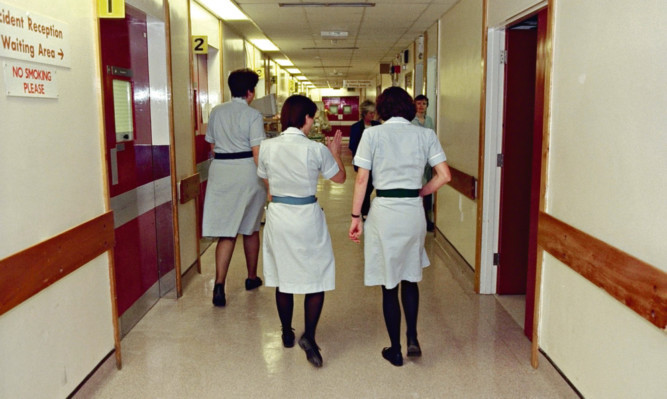
A secret army of thousands of NHS workers are stuck on controversial zero hours contracts.
The workforce keeps stretched frontline health services operational but with little by the way of protection or economic stability provided for employees.
The revelation nearly 8,000 NHS workers are on zero-hours contracts has been branded a disgrace by campaigners.
And it comes on the back of a damning Department of Work and Pensions study which has established one in five public-sector employers uses the contentious contracts which do not guarantee staff a minimum amount of work.
That is THREE times their level of use in the private sector which stands at around 7%.
Ian Tasker, of the Scottish Trades Union Congress, said zero hours contracts in the public sector should be outlawed.
“There should be an onus on public-sector employers to staff their organisations with proper part-time or full-time contracts that give their staff employment rights instead of these zero-hour contracts,” he said.
New figures released under freedom of information show 7,903 health staff are employed on the much-criticised deals.
A further breakdown lays bare how the NHS is increasingly relying on temporary staff with nearly 40,000 people now on a bank of workers available for short-term work.
Existing NHS workers often sign up for zero hours contracts as an alternative to overtime to supplement their contracted income with health boards, but fears were last night raised that the temporary deals were being dished out to make up for shortfalls in permanent staff numbers.
Susan McPhee, of Citizens Advice Scotland, said this could have a demoralising effect on workers.
“Our evidence shows that problems associated with zero hours contracts have increased significantly in recent years, and too often we see workers are left with no hours, no pay, no security and no chance,” she said.
Zero hours contract use is spread across five health boards including 1,385 in Tayside, 688 in Dumfries and Galloway and the largest 5,355 in Lanarkshire.
Nursing unions said the flexible working which stemmed from zero-hours contracts can suit students or workers with families but warned the deals can still carry downsides.
Royal College of Nursing Scotland Associate Director Norman Provan said: “Zero hours contracts can create a lot of stress for employees and they offer no benefits such as sick pay or holidays.”
Last year an Audit Scotland report revealed the NHS boards’ outlay on bank nurses across the country increased by 15% to £104.2m after years of consecutive falls in spending.
Dave Watson, of the Unison union, said while the numbers of staff registered on the bank appears high, he is more concerned over “the actual hours being undertaken by bank and agency staff”.
The Scottish Government explained: “These arrangements also allow those who require it the flexibility to continue to work without a fixed commitment that other contractual arrangements could not provide, and to remain as NHS employees.”
Findlay worried by sticking-plaster tactic
Scottish Labour’s health spokesman Neil Findlay described the way zero hours contracts are being used to prop up the NHS as “concerning”.
He said: “The fact that thousands of workers are on bank contracts, which we know now are often just zero-hours contracts by disguise, is a damning indictment of the SNP’s sticking-plaster approach to managing the NHS. Indeed, the increasing use and spending on bank and agency work is, as Audit Scotland stated, a signal that there are ‘strains in the system’.
“What’s most concerning is the sheer volume of NHS staff who are employed on zero hours contracts.
“While these types of contracts might suit some people who want flexible working conditions, the reality is that there are thousands of people working on NHS bank contracts who would like a full-time contract but instead don’t know from one month to the next what hours they will work.
“For those people they are exploitative and prevent them from earning enough money to make a decent living. This is bad for them and for patient care.”

Enjoy the convenience of having The Sunday Post delivered as a digital ePaper straight to your smartphone, tablet or computer.
Subscribe for only £5.49 a month and enjoy all the benefits of the printed paper as a digital replica.
Subscribe